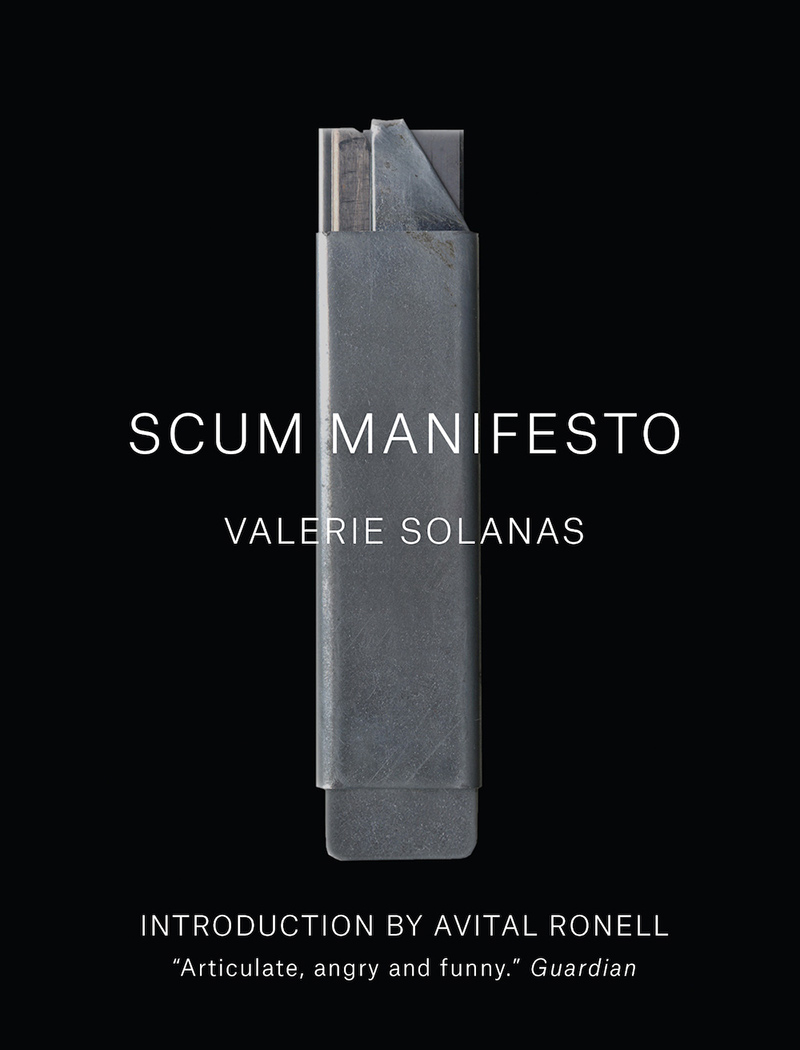Book Notes: SCUM Manifesto by Valerie Solanas

SCUM Manifesto by Valerie Solanas
Finished 2/09/20
A justifiably famous, passionate call for the destruction of masculinity.
I had never really planned on reading SCUM, but the combination of a recent political art show in which I was reading through historical quotes by feminists, and the siren’s song of Verso’s ebook sale put it easily before my eyes.
A few scattered thoughts:
1.)It’s really funny. Quite apart from the fairly standard view of SCUM as satire, the text itself is blisteringly funny. I laughed out loud at her description of the Hippy man as wanting to leave society and go “all the way out to the cow pasture where he can fuck and breed undisturbed and mess around with his beads and flute.”
2.)Like all manifestos, it has an element of utopianism, but this one wears its science-fiction on its sleeve–like, from the second paragraph. Solanas argued that eventually, science would lead us to a point where automation, genetic manipulation, and social engineering would create a society without males and male-ness. She speaks of men transforming scientifically themselves into women, of reproduction occurring only sporadically in laborities or not at all as death-curing technologies proliferate, of the replacement of males by machines. The result is a society without violence or coercion, where women can “explore, discover, invent, solve problems crack jokes, make music – all with love. In other words, create a magic world.” This is well within the science-fiction utopian tradition.
3.)Yeah, she says we should kill the men. But (perhaps strategically on my part, being a man) I read this more in parallel with James Baldwin’s famous dictum “As long as you think you’re white, there’s no hope for you”. Given that 3rd wave feminism’s critique of the coupling of sex and gender as an eternal, bio-behavioral essentialism didn’t exist when Solanas was writing, I’d like to think that what she was describing was the abolition of masculinity and patriarchy–the end of the linkage of being a man to violence, authority, the suppression of critique, and the subjugation of women. In any case, Solanas' real life violence against Warhol has grossly overshadowed her riveting writing, while many famous male authors visited worse violence upon their partners and excused for it.
4.)I skipped the contextual essay by Avital Ronnell. A quick scan suggested it wasn’t something I’d get a lot out of anyway, and in any case, she’s got her own problems.
5.)There are some really astonishing and gorgeously written insights in here about behavior, social life, and material culture. I re-read this passage multiple times and kept finding new things in it:
Our society is not a community, but merely a collection of isolated family units. Desperately insecure, fearing his woman will leave him if she is exposed to other men or to anything remotely resembling life, the male seeks to isolate her from other men and from what little civilization there is, so he moves her out to the suburbs, a collection of self-absorbed couples and their kids. Isolation enables him to try to maintain his pretense of being an individual nu becoming a `rugged individualist', a loner, equating non-cooperation and solitariness with individuality.
Everyone should read this.
